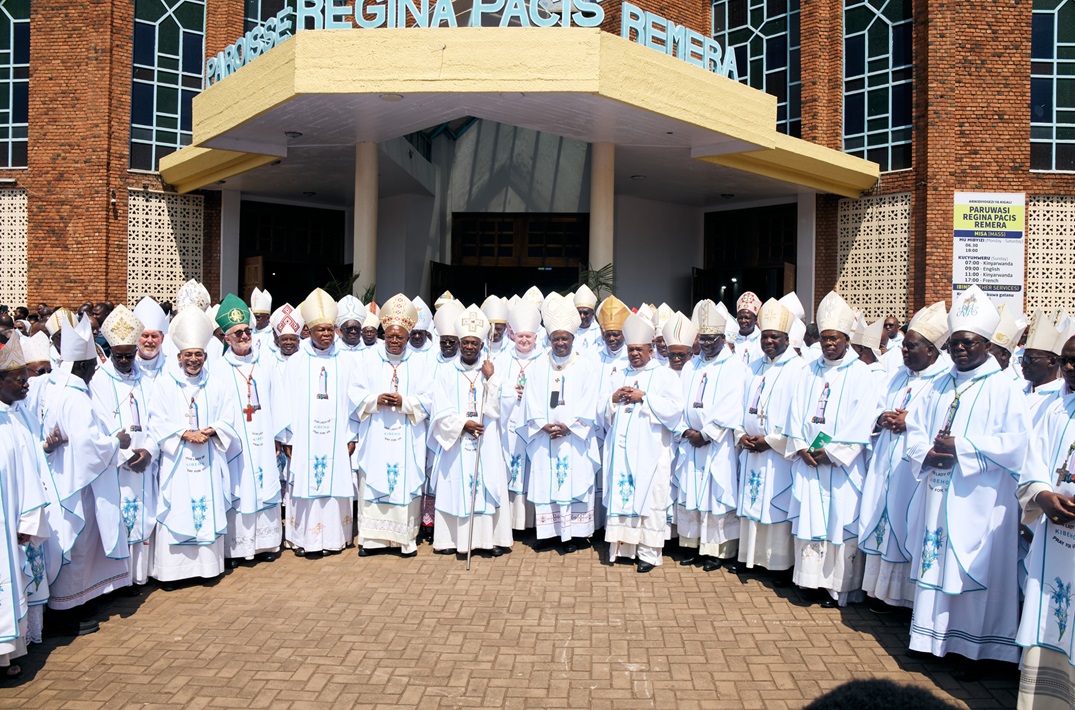By Paschal Norbert
KIGALI, AUGUST 5, 2025 (CISA) — African Catholic bishops have pledged to lead the Church on the continent into a future marked by renewed hope, reconciliation, and peace, following the conclusion of the 20th Plenary Assembly of the Symposium of Episcopal Conferences of Africa and Madagascar (SECAM), held in Kigali from July 30 to August 4, 2025.
In their final message, the Cardinals, Archbishops, and Bishops of SECAM outlined a bold vision for the Church in Africa over the next quarter-century, identifying Christ as the foundation of hope amid persistent socio-political instability, economic hardship, and conflict. The assembly, held under the theme “Christ, Source of Hope, Reconciliation and Peace: The Vision of the Church-Family of God in Africa for the Next 25 Years (2025–2050),” brought together high-ranking prelates and delegates from across the continent and beyond.
“In spite of the many challenges that remain, including violence, poverty, weak health structures, and environmental degradation, we choose not to fall into despair,” the bishops stated in their message.
Addressing the theme of hope, the bishops called for an active, realistic, and communal Christian commitment across the continent.
“Christian hope is not to be confused with a mere mental projection detached from reality,” they warned, adding “It is an active presence in the name of Jesus, alongside those who suffer, endure injustice, and are cast aside.”
The plenary emphasized the need for a Church that does not shy away from being “a sign of contradiction” in the face of systemic injustice and societal complacency. The bishops commended examples of Christian witness such as the recently beatified Congolese layman, Floribert Bwana Chui, hailed by Pope Francis as a “martyr of honesty and moral integrity” after being killed in 2007 for refusing to allow the importation of expired food into the Democratic Republic of Congo.
Turning to the pressing need for peace, the bishops expressed grave concern over interethnic and interstate conflicts that continue to impoverish African societies.
“No one truly wins in a conflict, whatever its nature,” the message stressed, noting “Reconciliation, forgiveness, and peace are essential for the development of all dimensions of human life.”
They emphasized that peace is not merely the absence of war, but a concrete path of hope rooted in Christ.
“Peace among the sons and daughters of the Church in Africa must be uncompromising and unconditional,” they said. “It must be rooted in the gratuitous gift of God given through Christ by the Holy Spirit.”
Calling for greater commitment to peace education, especially among youth, the bishops urged the Church to become a more active voice in conflict transformation and social cohesion.
“Educating the younger generations in the ways of peace must be among her priorities,” they stated, calling on political leaders to prioritize dialogue, protect the vulnerable, and promote peaceful coexistence.
Citing Pope Paul VI’s declaration that “development is the new name for peace,” SECAM leaders reiterated that sustainable development and integral human progress are only possible in a context of genuine and Christ-rooted peace.
The assembly also reflected on the Church’s identity as a “Church-Family of God,” a concept rooted in African ecclesiology. The bishops said this vision calls for renewed commitment to community, mutual responsibility, and healing of relationships.
SECAM also presented a 25-year roadmap structured around twelve pillars intended to guide the Church’s mission across Africa. The vision includes a renewed focus on evangelization and Catholic education, building a self-reliant Church, adopting a family model of leadership, deepening formation in synodality and missionary discipleship, promoting care for creation, empowering the youth, advancing justice and human development, enhancing interfaith dialogue, engaging in digital evangelization, improving healthcare ministries, strengthening liturgical life, and fostering ethical political engagement.
The bishops stressed that these priorities must be pursued not as isolated initiatives but as an integrated mission rooted in Christ and guided by the Gospel.
